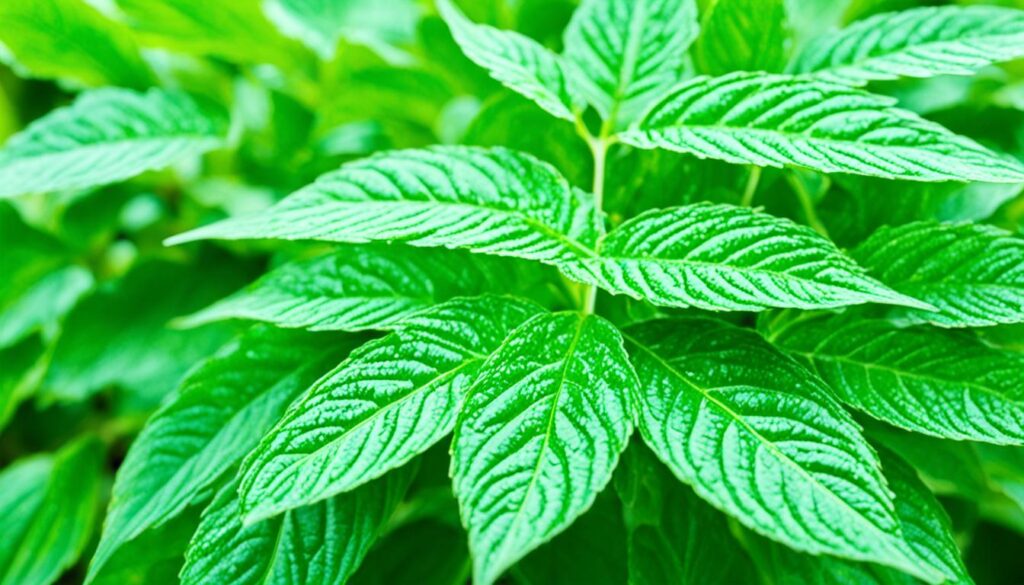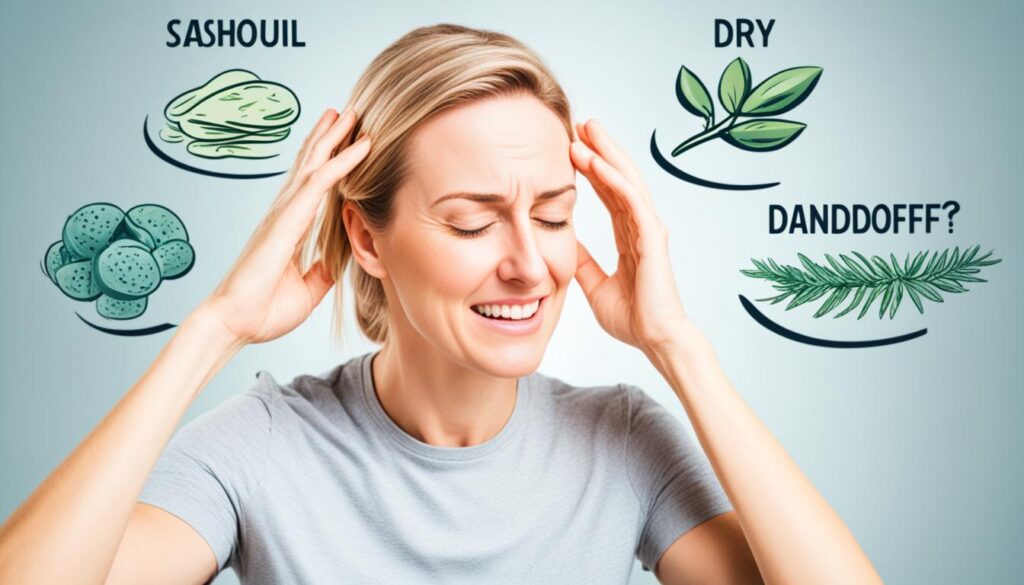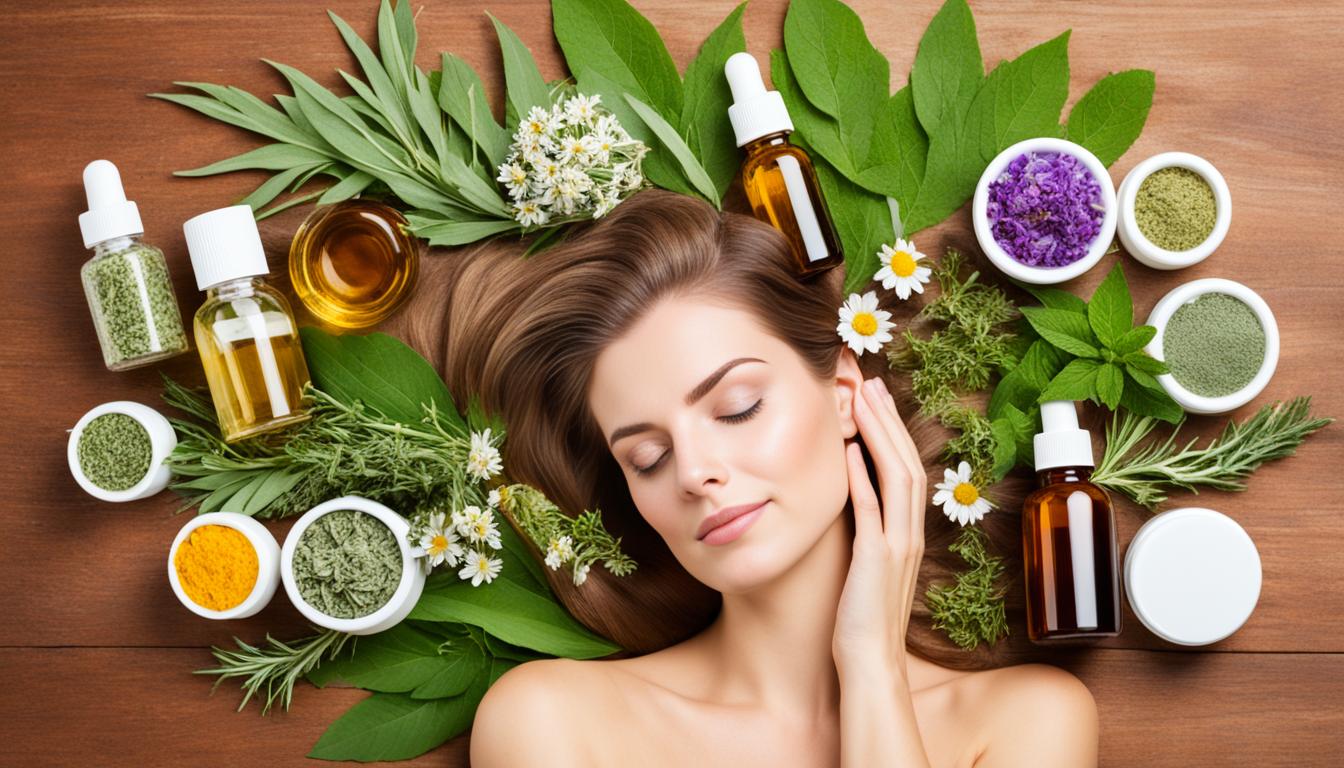If you’ve been dealing with an itchy scalp, you know how bothersome and uncomfortable it can be. The constant urge to scratch can be frustrating and embarrassing. But fear not, there are effective solutions available to help alleviate the itchiness and restore comfort to your scalp.
When it comes to choosing the best itchy scalp treatment, there are two main options to consider: natural remedies and medicated products. Natural remedies often utilize ingredients derived from plants or oils to soothe and moisturize the scalp. On the other hand, medicated products contain active ingredients that target specific scalp conditions, providing quick relief.
If you’re unsure which approach to take, it’s important to understand the underlying cause of your itchy scalp. Skin conditions such as seborrheic dermatitis, psoriasis, folliculitis, and contact dermatitis can all contribute to scalp irritation. Identifying the root cause can help guide you towards the most effective treatment.
Let’s delve deeper into the options available and their benefits so you can make an informed decision.
Key Takeaways:
- Natural remedies and medicated products are two main approaches for treating itchy scalp.
- Identify the underlying cause of your scalp itch to choose the most effective treatment.
- Natural remedies utilize plants or oils to soothe and moisturize the scalp.
- Medicated products contain active ingredients that target specific scalp conditions.
- Consulting a dermatologist can help you determine the best course of treatment for your itchy scalp.
Top Products for Treating Itchy Scalp
When dealing with an itchy scalp, it’s essential to find products that effectively provide relief. Here are some top-rated options:
- Nizoral A-D Anti-Dandruff Shampoo: This over-the-counter medicated shampoo is a popular choice for treating various scalp irritations. It contains ingredients that help control flaking, itching, and scaling, providing quick relief.
- Neutrogena T/Sal Therapeutic Shampoo: This shampoo is enriched with salicylic acid, which helps soothe itchiness and reduce scalp inflammation. It effectively removes build-up and relieves dryness, making it a great option for itchy scalp relief.
- SEEN Restore Scalp Serum: Designed specifically to balance scalp hydration and alleviate dryness and irritation, this serum is a game-changer. It nourishes the scalp, promoting a healthier environment and helping combat itchiness.
- Dyson Supersonic Hair Dryer: An innovative product that goes beyond drying hair, the Dyson Supersonic Hair Dryer features intelligent heat control technology, which helps reduce scalp temperature. This, in turn, can help minimize itching and flaking, leaving you with a comfortable and calm scalp.
These products have garnered positive ratings and reviews from users experiencing itchy scalp symptoms. Their effectiveness in providing relief makes them top choices for individuals seeking solutions.
Customer Testimonials
“I’ve tried numerous shampoos for my itchy scalp, and Nizoral A-D Anti-Dandruff Shampoo has been a game-changer. It’s gentle on my hair but tough on the itchiness, providing long-lasting relief.”
– Sarah M.
“Neutrogena T/Sal Therapeutic Shampoo is the only product that has successfully relieved my scalp itch. It’s so satisfying to have a calm and itch-free scalp after using it!”
– Michael R.
Comparison Table: Top Products for Treating Itchy Scalp
| Product | Main Benefits | Active Ingredients |
|---|---|---|
| Nizoral A-D Anti-Dandruff Shampoo | Controls flaking, itching, and scaling | Ketoconazole |
| Neutrogena T/Sal Therapeutic Shampoo | Soothes scalp itchiness and reduces inflammation | Salicylic acid |
| SEEN Restore Scalp Serum | Balances scalp hydration and relieves dryness | N/A |
| Dyson Supersonic Hair Dryer | Controls scalp temperature to reduce itching and flaking | N/A |
Effective Home Remedies for Itchy Scalp
In addition to medicated products, there are also effective home remedies for relieving itchy scalp. These natural remedies can provide relief from scalp irritation and promote a healthier scalp. Here are some ways to relieve itchy scalp:
Aloe Vera:
 Aloe vera is a natural moisturizer that can soothe dryness and reduce itching. Its gel-like consistency is rich in vitamins and minerals that nourish the scalp. Applying aloe vera gel directly to the scalp can provide instant relief and promote healing.
Aloe vera is a natural moisturizer that can soothe dryness and reduce itching. Its gel-like consistency is rich in vitamins and minerals that nourish the scalp. Applying aloe vera gel directly to the scalp can provide instant relief and promote healing.
Natural Oils:
Natural oils like coconut oil and sweet almond oil can also help moisturize the scalp and alleviate itchiness. These oils have hydrating properties that restore moisture to the scalp, reducing dryness and irritation. Gently massage the oil onto the scalp and leave it on for a few hours or overnight for best results.
Scalp Scrubs:
Using a scalp scrub can help exfoliate the scalp, remove dead cells and flakes, and improve the absorption of other scalp products. One recommended scalp scrub is the Kerastase Symbiose Exfoliating Anti-Dandruff Scalp Scrub.
By incorporating these natural remedies into your hair care routine, you can find relief from itchy scalp and promote a healthier scalp environment.
Professional Treatments for Itchy Scalp
In some cases, professional treatments may be necessary to effectively treat itchy scalp. Dermatologists and trichologists can provide specialized treatments to address scalp issues and provide much-needed relief. These professional treatments target the root causes of scalp itchiness and work to restore the scalp’s health and balance.
Scalp Microbiome Essence
One professional treatment for itchy scalp is the use of scalp microbiome essence. Nutrafol Stress Reliever Scalp Microbiome Essence is a popular choice among professionals. This treatment helps minimize scalp itch and flaking by promoting the growth of good bacteria on the scalp. By restoring the natural balance of the scalp microbiome, it can improve scalp health and alleviate itching and irritation.
Scalp Detox Treatments
Another professional treatment option is scalp detox treatments. Kiehl’s Amino Acid Scalp Detox Treatment Scrub is an effective scrub that exfoliates the scalp and removes buildup, such as dead skin cells, excess oil, and product residue. This treatment helps to unclog hair follicles, improve scalp circulation, and restore scalp health. Regular use of scalp detox treatments can significantly reduce scalp itch and promote a healthier scalp environment.
These professional treatments for itchy scalp offer targeted relief for individuals with persistent and severe scalp discomfort. They are designed to address the underlying causes of scalp itchiness and provide long-lasting results.
If you’re experiencing persistent scalp itch and over-the-counter remedies haven’t provided sufficient relief, consider consulting a dermatologist or trichologist for professional treatments. They can assess your scalp condition and recommend the most suitable treatment to address your individual needs.
By seeking professional treatments, you can find the relief you need and restore your scalp’s health.
The Impact of Dry Scalp on Hair Growth
Dry scalp can have a significant impact on hair growth. When the scalp is dry and flaky, it creates an unfavorable environment for hair follicles to thrive. This can lead to weaker, more fragile hair that is prone to breakage and hair loss. Therefore, it is important to address dry scalp to promote healthier hair growth.
By using the right treatments and care, individuals can improve scalp health and support optimal hair growth. Here are some scalp itch relief tips and how to get rid of itchy scalp:
- Maintain a proper hair care routine: Use moisturizing shampoos that are specifically formulated for dry scalp. Look for products that contain ingredients like tea tree oil, jojoba oil, or shea butter, as these provide hydration and nourishment to the scalp.
- Use natural oils: Applying natural oils such as coconut oil, olive oil, or argan oil to the scalp can help moisturize and soothe itchiness. Massage the oil into the scalp and leave it on for a few hours or overnight before shampooing.
- Avoid excessive heat and styling: Excessive heat from hair dryers, flat irons, and curling irons can worsen dry scalp conditions. Minimize the use of heat-styling tools and opt for air-drying whenever possible.
- Protect your scalp from the sun: Just like your skin, the scalp can also get sunburned. Protect your scalp from harmful UV rays by wearing hats or applying sunscreen specifically designed for the scalp.

“Addressing dry scalp is crucial for maintaining healthy hair growth. By implementing proper scalp care and using moisturizing products, individuals can alleviate itchiness and promote stronger, more resilient hair.”
| Treatment | Description | Benefits |
|---|---|---|
| Nizoral A-D Anti-Dandruff Shampoo | Medicated shampoo with ketoconazole to control flaking and itching | Reduces scalp irritation and promotes a healthier scalp environment for hair growth |
| Coconut oil | Natural oil with moisturizing properties | Hydrates the scalp and helps alleviate dryness and itchiness |
| Tea tree oil | Essential oil with antifungal and antibacterial properties | Helps soothe irritated scalp and prevent scalp infections |
Tips for Preventing and Managing Dry Scalp
Preventing and managing dry scalp requires adopting certain practices. By incorporating these tips into your hair care routine, you can effectively prevent and manage dry scalp, promoting a healthier, itch-free scalp.
Avoid Excessive Heat
Firstly, it is essential to avoid excessive heat from hair dryers and styling tools, as high heat can cause scalp issues. Exposing the scalp to high temperatures can strip it of its natural oils, leading to dryness and itchiness. Whenever possible, allow your hair to air-dry or use the lowest heat setting on your hair dryer.
Hydrate Your Scalp
Using moisturizing shampoos and conditioners can help hydrate the scalp and prevent dryness. Look for products that contain ingredients like hyaluronic acid, aloe vera, or coconut oil, which are known for their hydrating properties. These ingredients can nourish and moisturize the scalp, providing relief from itchiness and dryness.
Massage Your Scalp
Regularly massaging your scalp can stimulate blood circulation and promote a healthy scalp. Use your fingertips to gently massage your scalp in circular motions. This helps to distribute natural oils and nutrients to the hair follicles, keeping your scalp moisturized and reducing the chances of dryness and itchiness.
Use a Wide-Tooth Comb
When detangling your hair, use a wide-tooth comb instead of a brush. Brushes can be harsh on the scalp, causing irritation and further drying out the skin. A wide-tooth comb will minimize hair damage and help to distribute natural oils evenly, preventing dryness and itchiness.
Protect Your Scalp from the Sun
Just like your skin, your scalp can also get sunburned. Protecting your scalp from harmful UV rays can prevent further dryness. Wear a hat or use sunscreen specifically designed for the scalp when spending extended periods in the sun. This will shield your scalp from sunburn and minimize the risk of dryness and itchiness.
By following these tips, you can effectively prevent and manage dry scalp, ensuring a comfortable and healthy environment for your hair to grow.
Conclusion
When it comes to finding relief for itchy scalp, choosing the best treatment depends on individual preferences and the severity of the condition. Medicated shampoos like Nizoral A-D Anti-Dandruff Shampoo can effectively alleviate itchiness and control flaking and scaling. Natural remedies such as aloe vera and natural oils like coconut oil provide soothing relief and moisturize the scalp. For persistent scalp issues, professional treatments from dermatologists and trichologists offer targeted solutions.
By understanding the causes of itchy scalp and implementing preventive measures, individuals can effectively manage and prevent dry scalp, thus promoting healthier hair growth. Using moisturizing shampoos, avoiding excessive heat from styling tools, and massaging the scalp to stimulate blood circulation are some ways to relieve and prevent itchiness. Protecting the scalp from sun exposure is also crucial for maintaining scalp health.
Ultimately, finding the best treatment for itchy scalp involves trying different options and finding what works best for you. Whether it’s a medicated shampoo, a natural remedy, or a professional treatment, the goal is to enjoy a soothing and itch-free scalp. Take control of your scalp health and regain comfort and confidence.


